Click here to listen to the latest episode of NGI’s Hub & Flow, in which Patrick Rau, NGI’s Director of Strategy and Research, takes a look at the recent U.S. natural gas production trend, whether it is sustainable into the new year, and what it all means for prices going forward. Acknowledging that the pace…
Research
Articles from Research

Feds Expanding Efforts to Capture, Store CO2 Emissions
Nine research projects are getting a federal funding boost to advance methods and potentially reduce costs to capture and store carbon from the air, also known as direct air capture (DAC). The U.S. Department of Energy (DOE) said it has granted $24 million to universities and national labs across the country. The aim of the…

ExxonMobil, Princeton Up Partnership to Discover Ways to Reduce CO2, Improve Energy Technology
Looking for ways to lower emissions and improve energy technologies will continue under a renewed collaboration by ExxonMobil and Princeton University’s Andlinger Center for Energy and the Environment. The new five-year agreement, which builds on ExxonMobil’s participation beginning in 2015 in Princeton’s E-filliates Partnership, aims to help accelerate research, development and deployment of technologies that…

Penn State Researchers Tout Low-Cost Method for Discovering Marcellus Gas
Pennsylvania State University researchers have developed a method that may help producers more easily identify natural gas-rich areas in the Marcellus Shale for exploratory wells.

Barnett Natural Gas Production Not Linked to Methane in Water Wells, Say Scientists
No link has been found after four years of study between natural gas production activities in the Barnett Shale of North Texas and methane in water wells outside of Fort Worth, academic researchers said Tuesday.
Oxy, White Energy Assessing Two West Texas CO2 Projects
Occidental Petroleum Corp. (Oxy) and White Energy are evaluating the economic feasibility of a carbon capture project in West Texas that could help Oxy produce more Permian Basin oil.
ExxonMobil, MagnaBond Collaborating on Well Integrity Technology
ExxonMobil Upstream Research Co. has signed a three-year joint agreement with MagnaBond LLC to develop technologies that could enhance cost-effective evaluation of well cementing, casing and tubing.
DOE Banking on Six Projects to Advance Oil, NatGas Production Techniques
Six U.S. projects to test technologies for oil and natural gas development, including four in unconventional plays, have been selected by the Department of Energy (DOE) to receive $30 million total for cost-shared research and development.
U.S. Benefits from Maintaining Canada NatGas, Oil Trade, Research Says
Canadians will buy American if the United States border stays open for natural gas and oil flows, according to a defense of free trade crafted by the Canadian Energy Research Institute (CERI).
Brief — University of Calgary
The University of Calgary, in collaboration with Mexican universities and research institutes, has received C$44 million (MX$646.94 million) in funding for four knowledge networks to support energy reforms in Mexico. The funding commitment follows from a partnership the university signed in December 2015 with the Mexican Ministry of Energy (SENER). The research focuses on four areas: heavy oil, mature and unconventional oil resources, pipeline loss reduction, and industry and labor market development. Research networks will be created through the University of Calgary’sGlobal Research Initiative in Unconventional Hydrocarbon Resources. The networks will be led by the University of Calgary and the lead Mexican partner institutions: the Instituto Mexicano del Petróleo and Instituto Tecnológico y de Estudios Superiores de Monterrey. Funding is administered by CONACYT, a national funding organization in Mexico that works to advance science and technology. Research will be developed over the next three years.





